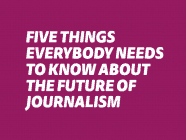A new study by C. W. Anderson looks at the practices of news aggregators, problematizes the “originality” of original content and calls for “networks of journalistic expertise”. The research suggests that aggregators and journalists may be closer to each other than it first appears.
Aggregators steal content, cut corners and make a profit by regurgitating original reporting. While journalists do the legwork, aggregators reap the benefits. Or so the conventional journalistic wisdom goes. Ever since aggregators like The Huffington Post and Buzzfeed began challenging the supremacy of traditional news sites, journalists discounted the “copy and paste”-mentality of these “impostors” as opportunistic and shallow. This image, however, is too simplistic, argues C. W. Anderson, an assistant professor in the Department of Media Culture at the College of Staten Island (CUNY) in his study “What aggregators do: Towards a networked concept of journalistic expertise in the digital age” (Journalism 18/8, 2013).
Anderson contends that journalistic expertise can no longer be confined to traditional notions of newsroom knowledge, “fixed property” that can be claimed and disseminated. “As defined in terms of practice,” he writes, “the line between aggregation and original reporting is not entirely clear, despite rhetorical attempts at category purification and boundary-drawing. Aggregators and journalists both compile shards of facts, quotes, documents, and links together in order to create narrative-driven news stories.” Instead of looking at aggregators and reporters as rivals, Anderson suggests to think about both groups as partners establishing “networks of journalistic expertise.”
The study consists of a content analysis of a Federal Communications Commission (FCC) workshop and ethnographic fieldwork. By examining the FCC workshop, Anderson wanted to highlight how academics, professionals and policy thinkers discuss journalistic products as either original or aggregated. As larger themes running through the debate he identified “the assumed connection between original reporting and a healthy democracy, the negative economic consequences of the digital economy for original content producers, and the confusion about what aggregators are and how they are different from search engines.”
In a second step, Anderson presents results from sustained ethnographic fieldwork of news aggregators. His aim is to describe what news aggregators are actually doing. The bottom line, as expressed in the words of a journalist turned aggregator that he interviewed: “There are skills to news aggregation.” Anderson describes aggregators as “hierarchizers, interlinkers, bundlers, rewriters, illustrators of web content” and identifies “news judgment” as their primary quality. In their own words, aggregators describe their work as “keeping your ear to the internet.” They also underscore that they add value to aggregated content. Yet, Anderson remarks, answers to the question of what actually constitutes “added value” remained “intriguingly nebulous.”
Andersons’s conclusion: “aggregators have accepted the website and the link, and categories of digital evidence more broadly, as valid items which can be rationally processed through the news network. Journalists, on the other hand, remain wedded to analog evidence – quotes, official government sources, first-person observations, analog documents and files – as the primary raw material out of which they build their stories. In part this relates to material practice, but it also relates to journalistic culture.”
Photo credit: Mike Licht / Flickr Cc
Tags: aggregators, Journalism, New media, News, News Aggregators













































